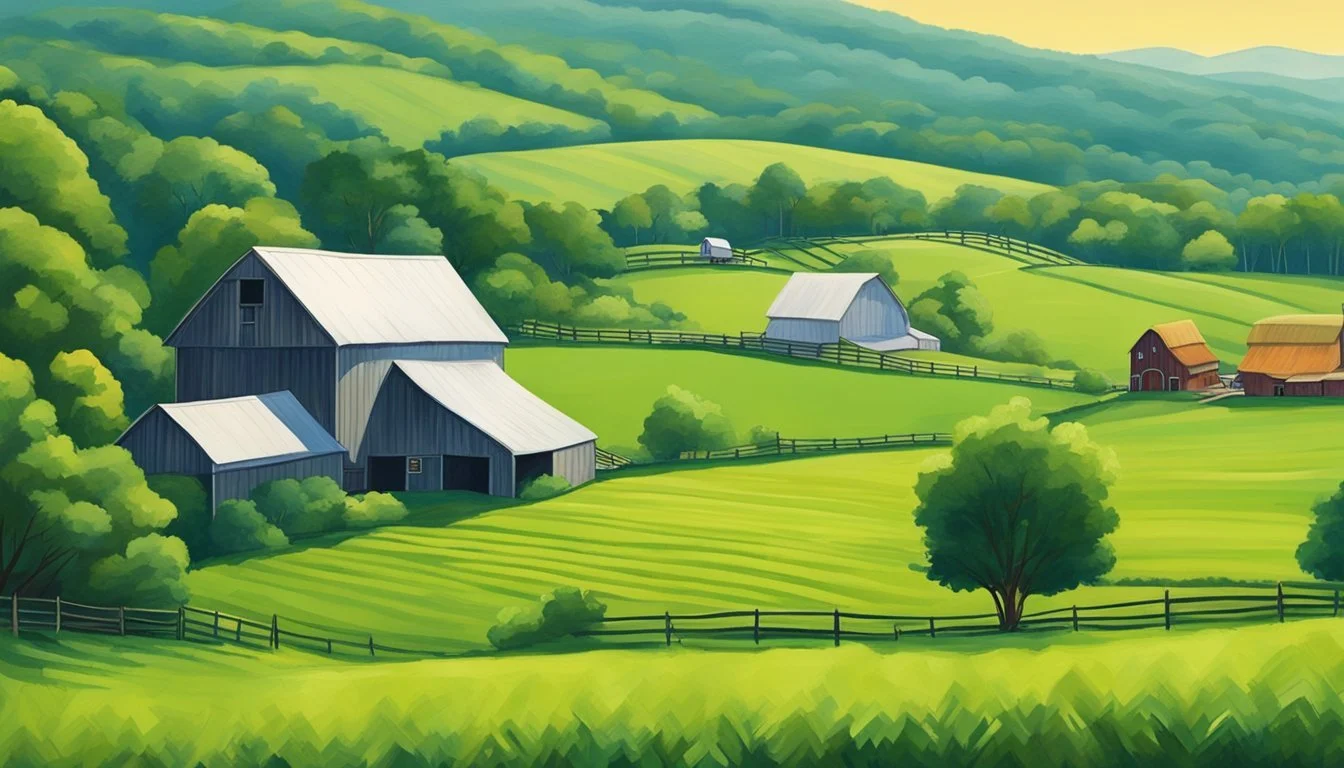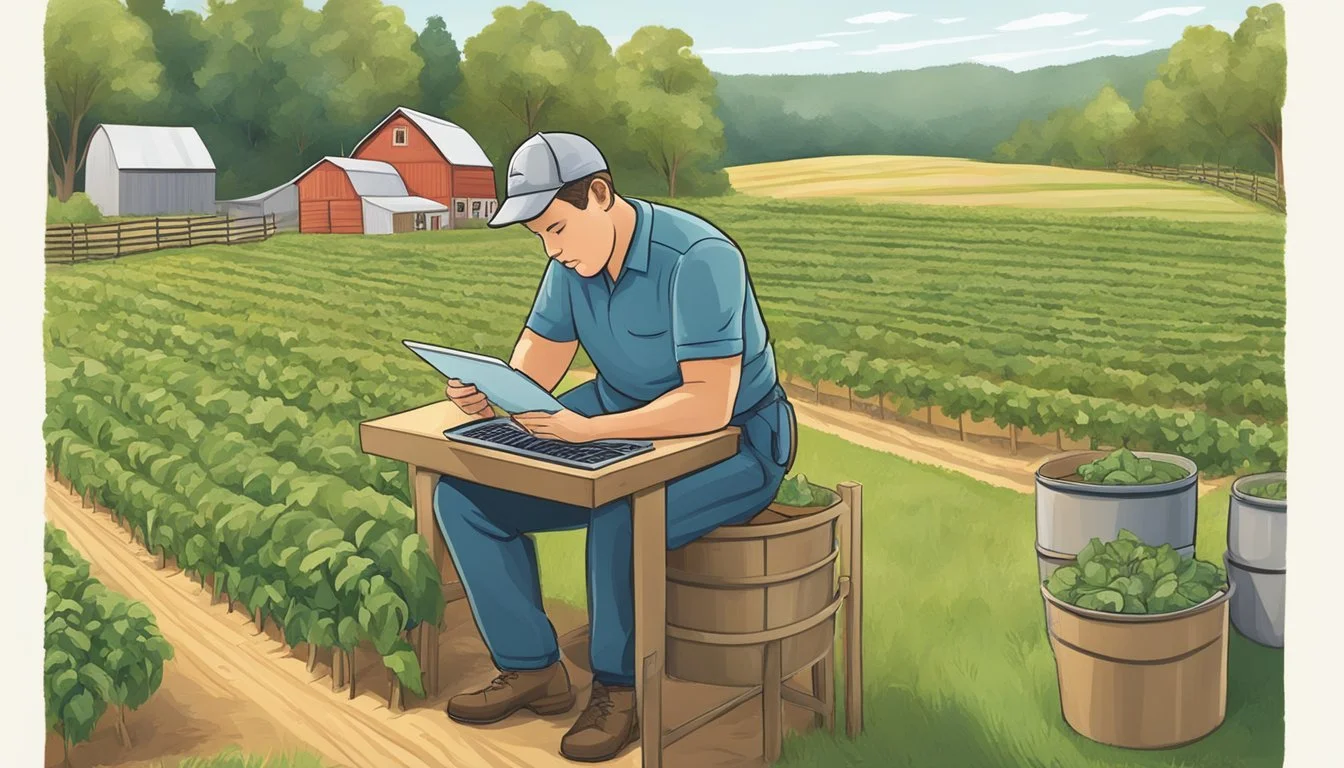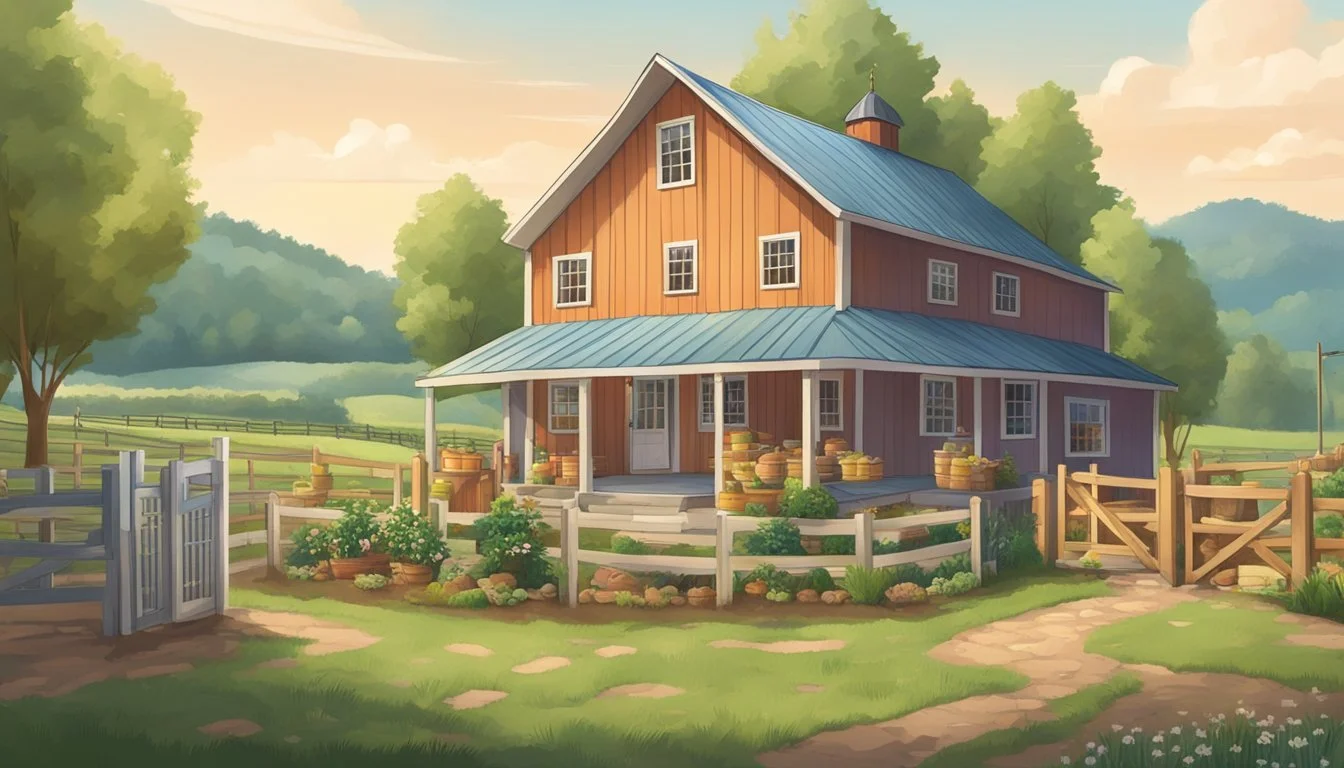Small Farms for Sale in Virginia
Your Guide to Idyllic Countryside Living
This Article is Part of State-by-State Guide to Buying Your First Small Farm
Virginia, known for its rich history and diverse landscape, offers a unique market for small farms that cater to a variety of agricultural enterprises. These small-scale farms for sale dot the bucolic countryside, presenting opportunities for prospective buyers to cultivate crops, raise livestock, or simply enjoy the pastoral lifestyle. The region's fertile soil and moderate climate make it an ideal location for a small farming venture, whether it's a family-run operation or an individual pursuing a passion for the land.
Small farms in Virginia come in various sizes and are spread across different counties, each providing distinct features and benefits. From the rolling acres in Mecklenburg County to the picturesque settings of the Virginia Mountains, buyers have a range of options to consider. These properties often include essential infrastructure such as barns, fences, and homes, setting the stage for a seamless transition into rural living.
As the interest in sustainable living and local food production grows, Virginia's small farms stand out as attractive investments. The state's agricultural tradition continues to thrive, supported by a community that values the connection between the land and its produce. With a range of prices and locations, these farms offer potential owners the chance not only to own a piece of Virginia's heritage but also to become an active part of its agricultural future.
Understanding Small Farms in Virginia
Virginia offers a diverse landscape for prospective farm owners with a blend of agricultural viability and lifestyle appeal. The state's historical roots in farming create a valuable context for understanding small farm ownership opportunities.
Defining Small Farms
In Virginia, small farms often encompass a range of acreages, generally constituting less than 50 acres. Rural mini farms and country farmettes might feature anywhere from under 10 acres to larger plots nearing the 50-acre upper limit. These properties usually combine elements conducive to both residential living and agricultural operations on a smaller scale compared to larger industrial farms.
Benefits of Owning a Small Farm
For many, the allure of owning a small farm in Virginia lies in the balance of lifestyle and function. Small farms allow individuals or families to engage in agricultural pursuits such as growing crops or raising livestock while also providing a serene, bucolic environment away from urban centers. Benefits include self-sufficiency, the potential for organic production, and the joy of hobby farming—pursuing farming as a passion rather than a full-scale commercial venture.
Types of Small Farms
The types of small farms can vary significantly in Virginia, depending on the purpose and the level of investment:
Hobby Farms: Geared more towards personal satisfaction rather than profit, these farms might include small orchards, vineyards, or gardens.
Rural Mini Farms: These farms might focus on small-scale livestock rearing or specialty crops, and they often serve local markets or farm-to-table enterprises.
Country Farmettes: Typically characterized by a comfortable family home with sufficient land for varied agricultural activities, often operated as a secondary income source or family endeavor.
In summary, Virginia's small farms offer a gateway to agricultural engagement paired with a coveted lifestyle, representing a spectrum from leisurely hobby-farming to more dedicated agricultural operations. The decision to purchase a small farm requires consideration of the desired commitment level and the specific aspirations a buyer may have for their rural lifestyle.
Navigating the Virginia Real Estate Market
The Virginia real estate market for small farms is diverse and dynamic. Potential buyers must consider current trends, purchase price intricacies, and factors influencing property value to make informed decisions.
Current Market Trends
In Virginia, the market for small farms showcases a variety of properties across different counties, with acreage ranging from under 10 acres to over 100 acres. Listings in Mecklenburg County indicate active demand with multiple properties pending sale, and prices varying significantly based on location and acreage.
Mecklenburg County Examples:
12.4 acres in Chase City listed at $39,900
91.4 acres in Chase City priced at $499,000
This suggests a market that is accommodating a range of buyer preferences, from modest to expansive land holdings.
Understanding Purchase Price
The purchase price of small farms in Virginia is influenced by multiple factors, including size in acres and existing infrastructure, such as houses and barns.
Comparative Price Points:
A 34-acre property without a house can be found in Boydton for $125,000
Conversely, in Baskerville, a 132-acre property with a four-bedroom house is listed at $499,000
These examples show how additional features can elevate the price of a property.
Factors Affecting Property Value
Property value in Virginia's market for small farms can fluctuate based on several factors:
Location: Proximity to cities and accessibility to roadways.
Land Quality: Soil fertility, water availability, and topography.
Infrastructure: Existing buildings, fences, and utilities.
Zoning Laws: Restrictions that can limit agricultural practices.
For instance, a small farm located nearer to urban centers like Richmond may fetch a higher price due to the potential for easier access to markets and amenities compared to more remote locations.
By scrutinizing these aspects, buyers can navigate the Virginia real estate market effectively, ensuring they find a property that fits their specific needs and budget.
Searching for Small Farms
When it comes to purchasing small farms in Virginia, prospective buyers should focus on thorough research and utilize multiple resources to find the right property. The key elements involve starting the search efficiently, exploring online listings, and potentially working with specialized real estate agents to navigate the market.
How to Begin Your Search
To initiate the search for small farms for sale in Virginia, an individual should first define their requirements, including property size, location, and budget. They should identify the type of farm sought—hobby farms, mini farms, farmettes, and larger plots are all categorically different in terms of maintenance and purpose.
Online Resources and Listings
The internet is a powerful tool for finding real estate, including small farms. Websites listing properties like LandSearch, LandWatch, and Land And Farm are excellent starting points. These sites compile extensive listings, which often include property details such as acreage and price. For example, listings on LandSearch show properties ranging from 12.4 acres for $39,900 to 91.4 acres for $499,000 in Mecklenburg County. On Land And Farm, prices start under $50,000 and can exceed $250,000, depending on various factors like location and acreage.
Working with Real Estate Agents
Seeking professional help from real estate agents with experience in Virginia's agricultural property market can be invaluable. They have access to listings that may not be available online and can offer insights into market trends and valuable advice on making a sound investment. An agent can provide a curated list of properties that match a buyer's criteria and help steer them through the complexities of purchasing land.
Key Considerations When Buying
When purchasing small farms in Virginia, buyers should prioritize evaluating the land's size and quality, considering necessary infrastructure for livestock and farming, and meticulously planning their financial investment.
Assessing Acreage and Land Quality
The acreage of a farm in Virginia can vary significantly, impacting both its cost and potential use. Prospective buyers must ensure the land meets their specific needs, whether for crop cultivation or livestock rearing. Quality of land includes factors such as soil fertility, which is crucial for growing crops and sustaining pasture. Buyers should inspect properties ranging from a few acres to larger expanses, gauging suitability based on intended agricultural practices.
Soil Type and Quality: Determining mineral composition and drainage.
Topography: Evaluating the land's layout, slopes, and potential for farming.
Water Sources: Identifying availability for irrigation or livestock.
Livestock and Farm Infrastructure
Infrastructure to support livestock, such as poultry, goats, and sheep, can vary widely among Virginia farms for sale. Purchasers should consider the condition and presence of fencing, barns, and animal housing, all of which contribute to the functioning of a farm. Existing structures tailored to these animals can provide a significant head start to the buyer.
Animal Housing: Assess barns and shelters for poultry, goats, and sheep.
Fencing: Check for perimeter and internal fencing suitable for intended livestock.
Financial Planning and Budgeting
A comprehensive financial plan is essential for purchasing a farm. Budgeting should account for the initial purchase price, potential land development costs, and the ongoing expenses of farm operation. The region and current market conditions influence land costs, which in Virginia can fall between $3,000 and $4,500 per acre. A detailed budget helps ensure that the buyer can sustain the farm long-term.
Initial Costs: Land price, legal fees, and infrastructure investments.
Operating Expenses: Feed, veterinary care, equipment maintenance.
Virginia Counties with Small Farm Availability
Virginia offers a diverse range of small farms for sale, providing ample opportunities for those interested in hobby farming, sustainable living, or simply owning rural acreage. Each county has its unique characteristics and offerings for potential small farm owners.
Augusta County Small Farms
In Augusta County, small farms for sale often come with ample acreage and the potential for diverse agricultural uses. This county is known for its scenic beauty and agricultural heritage, which makes it an attractive location for those looking to purchase a rural property. The availability of small farms in this region provides a perfect setting for both experienced farmers and newcomers to the agricultural community.
Carroll County Small Farms
Carroll County offers a variety of small farms that cater to both the rustic lifestyle and the modern farmer's needs. These farms typically provide a balance between open fields suitable for grazing or crop production and wooded areas for privacy and natural resources. Small farms in Carroll County often boast picturesque views and accessible locations, making it a desirable destination for potential small farm buyers.
Rockingham County Small Farms
Small farms in Rockingham County are known for their prime soil quality and generous land size, setting the stage for a range of farming activities. The county's favorable climate and rich agricultural history contribute to the success of small-scale farming operations. Rockingham's small farms are ideal for those seeking to engage in farm-to-table operations, specialty crop farming, or livestock raising, affirming the county's reputation as a supportive environment for agribusiness.
Financial Aspects and Ownership Types
In Virginia, small farms for sale often present diverse financial aspects and ownership types. These encompass various financing options, the prevalence of owner financing and loans, and considerations around foreclosed properties.
Financing Options for Small Farms
Prospective buyers typically encounter several financial pathways when purchasing small farms in Virginia. Traditional mortgages are common, but agricultural loans provided by institutions like the Farm Credit System may offer more tailored terms and rates. These loans cater specifically to rural property acquisitions and farming operations, recognizing the unique nature of agricultural investments.
Agricultural loans: Specialized terms, potentially lower interest rates.
Traditional mortgages: Conventional terms, readily available.
Owner Financing and Loans
Owner financing, a transaction where the seller acts as the lender, is particularly advantageous for buyers who may not meet conventional lending criteria. In these arrangements, the purchase contract includes a promissory note outlining repayment conditions. This method often requires a down payment, and the terms can vary significantly between contracts.
Down payment: Typically required.
Repayment terms: Specific to individual contracts.
Understanding Foreclosures
Foreclosed small farms can emerge as an option for buyers seeking lower purchase prices. However, they should be aware of the potential risks and complexities involved. Foreclosed properties are sold as-is, often requiring additional investment for renovation or to bring the farm up to operational standards.
Purchase price: Often lower than standard market value.
As-is condition: May necessitate additional investment for improvements.
Zoning and Legal Considerations
When purchasing real estate, especially land for sale for small farms in Virginia, understanding the zoning laws and permit requirements is crucial. These regulations shape the potential uses of the property and the types of structures that can be built.
Zoning Laws in Virginia
In Virginia, the Right to Farm Act ensures that farming and forestry operations are protected against unreasonable restrictions by local zoning ordinances. Specifically, localities cannot enact zoning ordinances that unreasonably limit agricultural structures or practices unless they significantly impact the health, safety, and general welfare of the public. For a buyer interested in small farms, it's essential to confirm that the land is zoned for agriculture and understand any relevant ordinances as they relate to the intended use of the property.
Building Permits and Restrictions
Building on agricultural land in Virginia can be subject to certain restrictions. These can include limitations on the types of structures allowed, their sizes, and their locations on the property. For instance:
Structural Types: Farm structures, such as barns or greenhouses.
Size Regulations: May be dictated by the property's acreage or zoning classification.
Location Boundaries: Setbacks from property lines or water sources.
Prospective buyers should check with local planning departments to determine exactly what permits are required for new construction or modifications to existing structures. It's worth noting that some activities may be exempt from needing a special use permit if they're on agriculturally zoned land, provided they do not have a substantial impact on the public welfare.
Farming Lifestyle in Virginia
Virginia's farming lifestyle strikes a balance between long-standing agricultural traditions and the challenges faced by modern small farm owners. Those considering entering the farming lifestyle, particularly through purchasing rural mini farms or small farms for sale, should be prepared for a life that blends community involvement with the practicalities and personal satisfaction of rural living.
Community and Rural Living
The heart of Virginia's rural farming lifestyle is its sense of community. Individuals seeking to purchase small farms or rural mini farms in Virginia are typically welcomed into tight-knit communities. These communities are defined by mutual support and shared values, welcoming new farmers and ensuring that the rural character of Virginia is preserved. The lifestyle often includes:
Local farmers markets: where individuals can sell their produce and engage with the community.
Agricultural cooperatives: which provide support in the form of shared resources and knowledge.
Rural living on Virginia's small farms often necessitates self-sufficiency and a solid connection to the land, as living farther from urban centers may limit access to certain conveniences.
Challenges and Rewards of Farm Life
Owning a small farm in Virginia comes with its set of challenges and rewards. Farmers must be prepared for:
Hard work: The responsibility of maintaining the land and tending to crops and livestock can be demanding.
Economic factors: These can include fluctuating market prices, and managing costs such as property taxes and equipment upkeep.
On the other hand, the rewards are also significant. Farm owners experience:
A sense of achievement: Growing successful crops or raising healthy livestock brings immense personal satisfaction.
Lifestyle benefits: Enjoying the peace of the countryside, the slow pace of life, and the beauty of Virginia's varied landscapes.
In summary, Virginia's farming lifestyle is marked by community bonds, the necessity for adaptability, and the joys and toils intrinsic to managing a small farm.
Conclusion
When individuals consider purchasing small farms in Virginia, they benefit from a market that is both diverse and abundant. The available properties span various counties, often featuring attractive acreage options and competitive pricing.
Buyers can find properties as follows:
Budget-friendly selections ranging below $100,000.
Mid-range farms valued between $100,000 to $499,999.
More expansive and feature-rich farms priced above $500,000.
These small farms come with varying features, including but not limited to:
Undeveloped land offering a blank canvas for customization.
Functioning farms with existing infrastructure in place.
Virginia's rich agricultural history and supportive community provide an ideal environment for those venturing into small-scale farming. Local land regulations and markets enable farmers to flourish, catering to those seeking either traditional farming or more niche operations.
Potential buyers should do thorough research and consider variables such as:
Location: Proximity to markets and communities.
Soil Quality and Topography: Suitability for desired agricultural activities.
Infrastructure: Existing facilities and the cost of adding needed structures.
This variety, coupled with Virginia's favorable farming conditions, makes the state's small farms an appealing option for both experienced farmers and newcomers to the agricultural scene.







